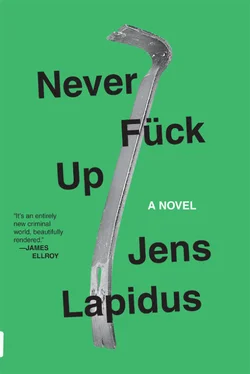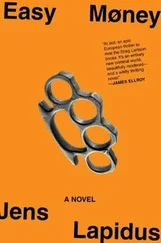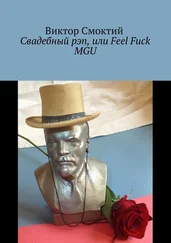He lay down on the bed. There were bottles of pills on the floor.
Thought: Rat fuckers in the area. Rat cunts on his running trail. And now rat shits in the subway.
He shook out two 5-milligram tablets. Broke one in half in his hand. Put one whole and one half tablet on his tongue. Went into the kitchen. Drank a gulp of water. Washed them down.
Lay down in the couch in the living room.
Turned on the TV. Tried to relax.
Woke up after only a few minutes.
He heard voices. Sounds from the TV? No.
Loud voices again, close by.
They came from the other side of the wall. Someone screaming.
He recognized something. Arabic diphthongs.
He listened. Lowered the volume on the TV.
After a while, he understood. A fight in the apartment next door. It had to be the girl he’d met in the stairwell. Yes, he heard a woman’s voice. And someone else. Maybe her guy, dad, lover. They yelled. Screamed. Disturbed.
He tried to hear what they were arguing about. Niklas’s Arabic: very basic, but enough to pick up some dirty words.
“Sharmuta,” the man’s voice yelled in there. That was harsh—whore.
“Kh’at um’n!” Harsher—go fuck your mother.
She screamed again. Louder. More aggressive. At the same time, there was panic in her voice.
Niklas sat up on the couch. Pressed his head closer against the wall.
Felt the stress creeping up in him—the unease of taking part, uninvited, in the private lives of other people. And even worse: the unease in the girl’s voice over there.
She shrieked. Then there was a sharp sound. The girl grew silent. The man screamed, “I’m gonna kill you.”
More thudding sounds. The girl begging. Whimpering. Pleading for him to stop.
Then another tone, without aggression.
Just terror. A tone Niklas’d heard so many times before.
The new sounds felt closer than anything he’d heard in Arabic.
More familiar.
More like his own story repeating itself.
The chick in the apartment next door was taking a beating.
9

Dinner: pork tenderloin and a baked potato. Garlicky cream sauce and salad. Thomas didn’t touch the salad. Honestly: vegetables were for women and rabbits. Real men don’t eat salad, as Ljunggren said.
Åsa, his wife, sat across from him, prattled on as usual. Today, it was about the garden. He picked up a word here and there. Immortelles, planted in May: faintly scented flowers in a blend of colors during the summer.
The only scent he registered: the smell of dirt, violence, and death. The scent that always followed an officer on patrol. No matter how much you tried to think about other things—the city’s stench stuck. The only colors he saw: concrete gray, police blue, and blood red from poorly aimed injection needles and assaults. No matter how many flowers Åsa planted, the shades of violence always made up the primary color scales in his mind.
To some people, Stockholm was a charming, cozy, genuine city. Picturesque, with polite and forthcoming people, clean streets, and exciting shopping areas. To cops, it was a city filled with booze, vomit, and piss. To many people, it was egalitarian public-service centers, interesting cultural projects, trendy cafés, and beautiful façades. To others—just façades. Behind them: beer dives, junkie crash pads, brothels. Battered women whose friends ignored their bruised faces, heroin junkies who shoplifted a half hour’s worth of bliss in the local grocery store, teen punks from the projects who reigned free—knocked down old people who were on their way to the bank to pay their rent. Stockholm: Mecca of thieves, drug dealers, and gangs. Horndog water hole. Hypocrite playing field. The welfare state’d breathed its last, labored breaths sometime in the eighties, and no one gave a damn. The only place where the two worlds seemed to meet was at the state-run liquor store. One side was looking for upscale, boxed wine for a dinner party, the other was looking for a quart of hard stuff for the night’s booze-out. But soon there’d probably be two different liquor stores, too—one where only the dutiful citizenry was welcome and another for the rest. Class warfare in the liquor-store line. Thomas thought about his dad, Gunnar. He’d passed away from prostate cancer three years ago, only sixty-seven years old. In a way, Thomas was glad his old man didn’t have to see this shit. He’d been a real working-class hero, a man who’d believed in Sweden.
But someone had to clean up. The question was just if it was his responsibility. He doubted the system too much. Broke the rules too much. Shit, he felt like some bitter detective in a sleepy Swedish crime thriller. Whining about society and solving crime. That wasn’t really his thing, was it?
“Maybe we should get a little greenhouse? What do you think, Thomas?”
He nodded. Woke from his reverie. Heard the pain in her voice. How she longed for him to soften. How their problems might be solved through him. He loved her. But the problem involved both of them. They couldn’t have kids. Angst squared. No, fuck, cubed.
They’d tried everything. Thomas’d stopped drinking for several months, they tried to have sex as often as they could, Åsa popped hormones. Two years ago, they got close. Huddinge Hospital worked miracles. Åsa got his stuff injected directly through a catheter—artificial insemination. Weeks went by. The pregnancy went according to plan. They passed the twelve-week line, when most people start telling others. When it should be safe. But something went wrong—the baby died in the fifth month. They had to cut Åsa open to get it out. In his fantasies, he saw how they plucked out the dead fetus—his child. Saw arms, legs, a tiny body. He saw a head, a nose, a mouth. Everything.
He wanted it so badly. A must, something that’d seemed given. A condition for the good life. Adoption was always a possibility. They’d get approval. Childless, middle class, stable, orderly—at least on paper. Ready to love a little one above all else. But the idea didn’t jibe with him—Thomas didn’t like the thought of it. His entire body itched with resistance. Sometimes he was ashamed of the reason. Sometimes he stood by it, straight-backed. It wasn’t right. Not at all. But the reason he didn’t want to adopt was that he wanted a kid that looked like him and Åsa. No Chinese, African, or Romanian. He wanted a kid who would fit into the kind of family life he wanted to build. Go ahead, call him a racist. A prejudiced ass. A Neanderthal. He couldn’t care less, even if he obviously didn’t go to work and broadcast his feelings on the issue—he’d never adopt anything but a Nordic child.
Åsa wouldn’t forgive him.
Their house was too small to fit a family, anyway. In Tallkrogen. Twelve hundred square feet in white-painted wood. Split level. The hall, the kitchen, a guest bathroom, and the living room were on the first floor. Upstairs: two small bedrooms, a small TV room, and a bathroom. They used the TV room as an office/gym. An exercise bike and a padded bench. A couple of free weights, a barbell in a cabinet along with binders, a sewing machine, and a couple of dress patterns in a pile. An office chair that Thomas’d been allowed to take home when they reorganized the precinct. Otherwise, empty. Thomas didn’t like to collect junk.
He called it a dollhouse. That was the feeling he got, anyway. The house didn’t even have a mudroom or a real basement. It wouldn’t work, especially not if they were able to adopt kids. Where the hell were they going to put a crib, a changing table, a Ping-Pong table?
Читать дальше














